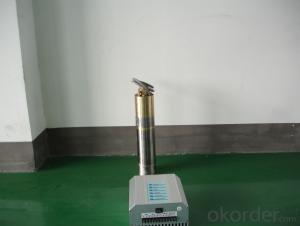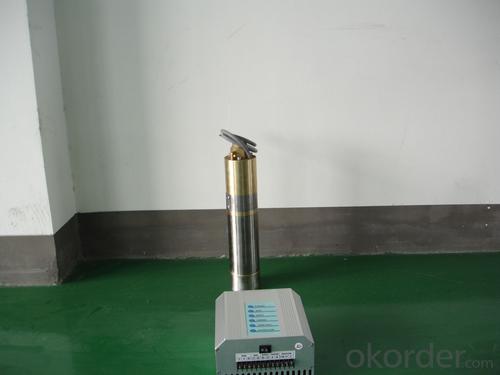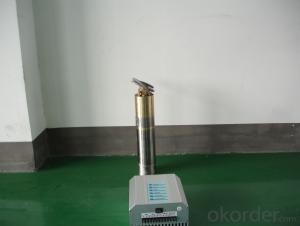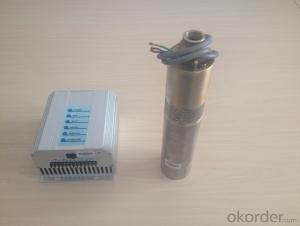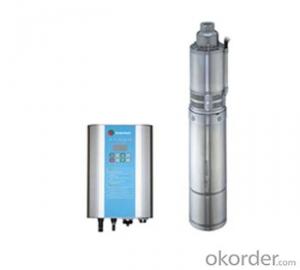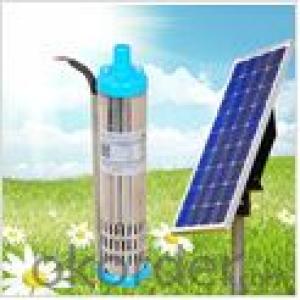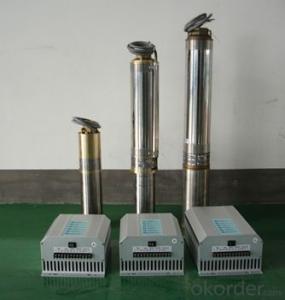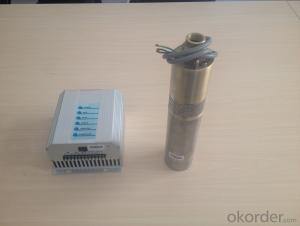Solar Pump Home Depot DC Submersible Pumps
- Loading Port:
- China Main Port
- Payment Terms:
- TT OR LC
- Min Order Qty:
- -
- Supply Capability:
- -
OKorder Service Pledge
OKorder Financial Service
You Might Also Like
Item Description :
This superb new addition to our solar fountain range comes with a 10w solar panel,and a powerful fountain pump that is capable of producing fountains of up to 2m in height. As well as being easy to set up and use.Instruction manual is supplied for assembly and maintenance.
Solar Fountain Key Features :
Powered by direct sunlight
No high voltage electric mains required
Safe for children
Max. height of fountain: 2M
Max. flow capacity: 800 L/H(176 GAL)
10W Polycrystalline solar panel included
18V DC brushless pump
Solar Pump Features :
Can produce fountains up to : 2M (tube height) 1.4M (fountain height)
Comes with multiple nozzle accessories
Cable Length : 5M
Solar Panel Features :
10W peak power.
Polycrystalline highly efficient solar panel
Comes mounted in aluminium frame
Comes with ground stake and rotating knob so you can angle your panel toward the sun
What You Will Get :
10W solar panel
Solar pump
Ground Sake
Nozzle accessories
Precautions :
DO NOT alter or change the product itself or its components
Operate pump in freshwater only, never above 50 degrees celsius
Keep away from flammable liquids
Do not connect to any other power supply other than the included
- Q: Can a solar pump be used for fire-fighting purposes?
- Yes, a solar pump can be used for fire-fighting purposes. Solar pumps are capable of providing water pressure and flow required for fire suppression and can be an efficient and sustainable option in areas where grid power is unreliable or unavailable. They can be used to pump water from a natural source like a well, pond, or reservoir to extinguish fires.
- Q: Are there any limitations to the size of a solar pump system?
- Yes, there are limitations to the size of a solar pump system. The main limitation is the availability of space for installing the solar panels. Solar panels require adequate sunlight exposure to generate electricity, and the size of the solar pump system will depend on the available space for installing the panels. Additionally, the capacity of the solar pump itself can also limit the size of the system. Larger capacity solar pumps require more power, which means larger solar panels and a larger system overall. Finally, the budget can also be a limitation as larger solar pump systems are generally more expensive to install and maintain.
- Q: Can a solar pump be used for desalination processes?
- Yes, a solar pump can be used for desalination processes. Solar pumps can provide the necessary energy to power desalination systems, such as reverse osmosis, where seawater is converted into fresh water by removing salt and other impurities. The use of solar energy makes the process more sustainable and environmentally friendly.
- Q: How does the altitude affect the performance of a solar pump?
- The altitude can have a significant impact on the performance of a solar pump. As the altitude increases, the atmospheric pressure decreases, which in turn affects the pump's efficiency and output. At higher altitudes, the density of air decreases, leading to a reduction in the amount of oxygen available for combustion in the pump's engine. This can result in a decrease in power output, as the engine may not be able to generate the same level of force as it would at lower altitudes. Additionally, the decrease in atmospheric pressure affects the pump's ability to draw water from a source. The lower pressure can cause a decrease in the suction power, making it more difficult for the pump to lift water to the desired height. This can result in a decrease in pumping capacity and overall efficiency. Furthermore, the decrease in air density at higher altitudes can impact the cooling of the pump's components. The reduced air density makes it harder for the pump to dissipate heat, potentially leading to overheating and decreased performance. It is important to consider the altitude when selecting a solar pump and ensure that it is appropriately sized and designed to operate effectively at the desired location. Adjustments or modifications may be necessary to optimize the pump's performance at higher altitudes, such as using a more powerful engine or employing different pumping techniques to compensate for the reduced atmospheric pressure.
- Q: What is the expected maintenance schedule for a solar pump?
- The expected maintenance schedule for a solar pump typically includes regular checks for debris or blockages in the pump system, cleaning of the solar panels to ensure optimal sunlight absorption, and inspection of the battery and controller for any signs of wear or malfunction. Additionally, it is recommended to schedule professional maintenance at least once a year to ensure proper functioning and address any potential issues.
- Q: Can a solar pump be used for water circulation in industrial processes?
- Yes, a solar pump can be used for water circulation in industrial processes. Solar pumps are increasingly being adopted for various industrial applications due to their cost-effectiveness, energy efficiency, and environmental friendliness. They can efficiently circulate water in industrial processes, providing a sustainable and renewable energy solution.
- Q: Can a solar pump be used in areas with frequent power fluctuations or voltage instability?
- Yes, a solar pump can be used in areas with frequent power fluctuations or voltage instability. Solar pumps operate on direct current (DC) power and are not dependent on the grid electricity supply. They are designed to handle voltage variations and can continue to function even during power fluctuations or voltage instability. Additionally, solar pumps often come equipped with built-in protection mechanisms to ensure their safe operation in such conditions.
- Q: Can solar pumps be used for water supply in remote research stations or observatories?
- Yes, solar pumps can be used for water supply in remote research stations or observatories. They provide a sustainable and reliable source of power for pumping water, making them ideal for off-grid locations. Solar pumps require minimal maintenance and can operate efficiently even in remote and harsh environments. Additionally, they eliminate the need for fuel or electricity connections, reducing costs and environmental impact.
- Q: Can a solar pump be used for industrial processes requiring water circulation?
- Yes, a solar pump can be used for industrial processes requiring water circulation. Solar pumps are capable of providing reliable and efficient water circulation for various industrial applications such as cooling systems, irrigation, and wastewater treatment. They can be customized and sized to meet the specific requirements of different industrial processes, providing a sustainable and cost-effective solution.
- Q: Can a solar pump be integrated with other renewable energy sources like wind turbines?
- Indeed, a solar pump has the capability to be integrated with alternative renewable energy sources such as wind turbines. This integration, referred to as hybrid renewable energy systems, allows for the enhancement of power generation efficiency and reliability. By combining the intermittent nature of wind power with the consistent power generation of solar energy, a hybrid system can provide a more stable and dependable power supply for the solar pump. The integration of a solar pump and wind turbine can be achieved through the utilization of a hybrid controller or an inverter. These devices effectively manage the flow of power between the two sources. The controller ensures that the power generated by each source is efficiently utilized and, if necessary, stored in a battery bank for future use. During periods of low sunlight, the wind turbine can supplement the power requirements of the solar pump, ensuring continuous operation. Similarly, when there is insufficient wind, the solar panels can compensate by providing the necessary power. This hybrid approach maximizes the utilization of available renewable energy resources, reducing dependence on non-renewable energy sources and promoting the overall sustainability of the system. Furthermore, the integration of a solar pump with a wind turbine can also help overcome the limitations of each energy source individually. For example, wind power is generally more abundant at night, while solar power is at its peak during the day. By combining these two sources, the system can provide a more balanced and consistent power supply throughout the day and night. In summary, the integration of a solar pump with other renewable energy sources, such as wind turbines, offers substantial advantages in terms of increased power generation, improved reliability, and enhanced sustainability. This hybrid approach enables a more efficient utilization of available resources and contributes to the overall transition towards a cleaner and more environmentally friendly energy future.
Send your message to us
Solar Pump Home Depot DC Submersible Pumps
- Loading Port:
- China Main Port
- Payment Terms:
- TT OR LC
- Min Order Qty:
- -
- Supply Capability:
- -
OKorder Service Pledge
OKorder Financial Service
Similar products
Hot products
Hot Searches
Related keywords
